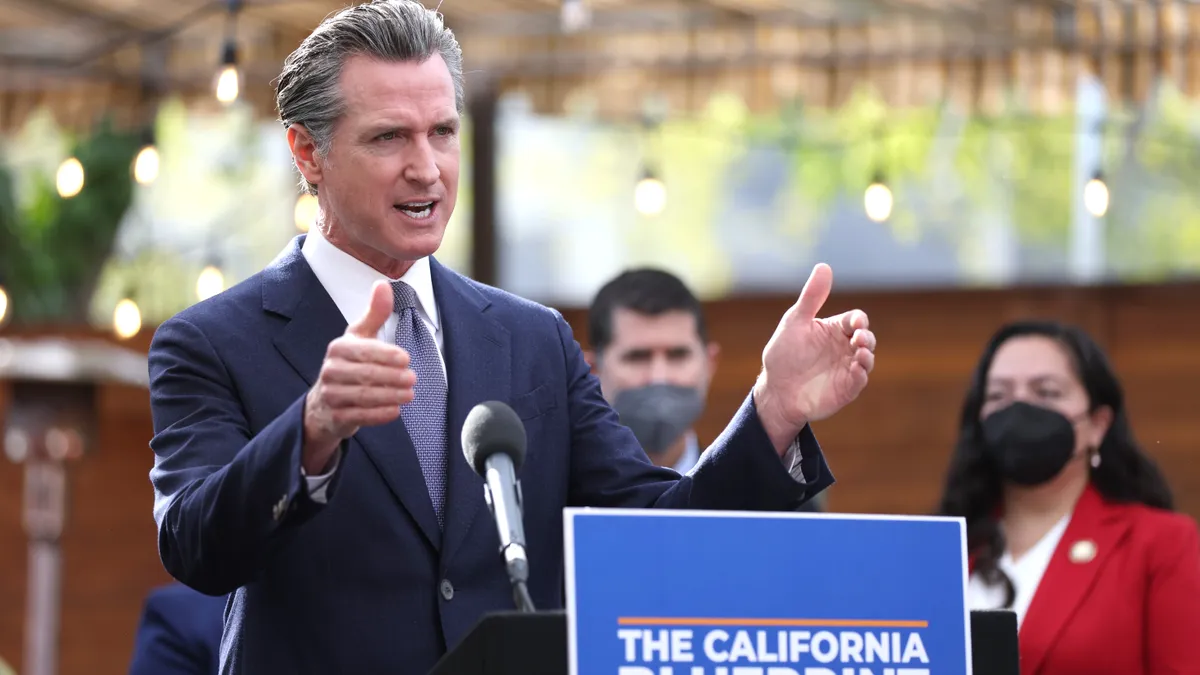Dive Brief:
- California's Department of Industrial Relations has stepped up inspection of publicly funded construction sites in the state to better ensure worker compensation and compliance.
- In January, DIR announced its Labor Enforcement Task Force would lead a new initiative to ensure employers on those jobsites provide workers' compensation insurance and adhere to labor laws, such as skilled and trained workforce requirements, workplace health and safety requirements and apprenticeship standards.
- The task force will also crack down on pay, as employers must pay all workers employed on qualifying public works projects the prevailing wage determined by the DIR according to the type of work performed and the location of the property.
Dive Insight:
New legislation spurred the initiative, according to DIR spokeswoman Jeanne-Mairie Duval. An assembly bill signed by Gov. Gavin Newsom (pictured above) in 2021 appropriated $30 million for such efforts.
"The funds are to be used for the Department of Industrial Relations' strategic enforcement focused on construction, alteration and repair projects, as subject to provisions of Section 1785 of the Labor Code," Duval said.
What does the new initiative mean for construction companies operating in the Golden State?
"Construction contractors working on publicly funded work sites will experience no negative impact, as long as they are complying with the requirements," Duval said.
Public works contractors, as defined by DIR, include prime contractors and subcontractors that work or bid on public works projects.
Anyone working on public works projects must be paid prevailing wages, and projects of $30,000 or more must meet DIR's apprenticeship requirements. Failure to comply with public works requirements can result in civil penalties, criminal prosecution or both, Duval said. All public works contractors must also submit certified payroll records.
Operating under the DIR, the task force is a coalition of California state government enforcement agencies including Cal/OSHA, the Labor Commissioner's Office and the Contractors State License Board. The group teams with local agencies to battle "the underground economy," which refers to any business which operates without following public work requirements, creates unsafe work conditions or attempts to gain an unfair economic advantage by dodging responsibilities.
California is not the only state to take steps to crack down on improper employee compensation practices in construction. In New York, a state law that aims to combat wage theft in the industry went into effect on Jan. 4.
New York Senate Bill 2766-C makes general contractors responsible for ensuring all workers on a project, including those employed by subcontractors, are correctly paid. It also imposes more stringent reporting requirements for subcontractors.
Wage theft is a multi-billion dollar problem that spans industries across the United States. One of the most comprehensive U.S. wage theft studies, published in 2009, found low-wage workers surveyed in Chicago, Los Angeles and New York City were routinely denied proper overtime pay and were often paid less than the minimum wage.
According to CBS, some economists say wage theft is so pervasive that it costs workers at least $15 billion per year.













